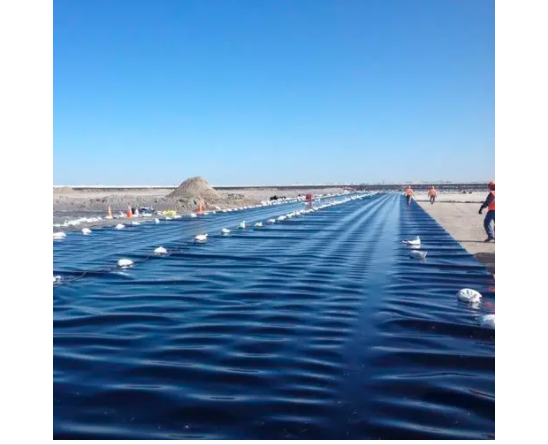- Understanding the Role of Geomembrane Liners in Waste Management
- Innovations in Geomembrane Liners for Water Management
- Geomembrane Liners: A Comprehensive Guide
- The Future of Geomembrane Liners in Civil Engineering
- Geomembrane Liners: Enhancing Landfill Stability
Manager:
WhatsApp:+86 177 0135 2670
Tel:+86 177 0135 2670
Email:marketing@okorder.com
Address:3rd Floor, No.2 Building, No.1 Sanlihe Road
The role of waterproofing geomembrane in modern infrastructure: The unseen protector
Modern construction and environmental protection has a term called “waterproofing geomembrane” which is a silent, yet powerful partner in the quest for sustainable resilient infrastructure. These sheets are made of thin, flexible synthetic polymers that have been employed in numerous projects such as landfills, water reservoirs, mining operations and ponds created for landscaping purposes. This narrative is an authentic tribute to waterproofing geosynthetic liners. It captures their essence, versatility, and its profound impact on built and natural environments.
The Waterproofing Geomembrane Made Known
Apart from being just a barrier between liquids and structures, the waterproofing geomembranes work like custodians of our environment against the invasion of water. These geomembranes are crafted out of resistant polymers like HDPE, PVC or EPDM to form an impervious layer that prevents water penetration thereby ensuring the longevity of these constructions.

Various Uses Of Geomembranes: A Myriad Of Applications.
Waterproofing geomembranes applications are as varied as the areas covered. For example, waste disposal cells should have a liner to protect leachate from getting into the groundwaters below them. There are also tailings ponds lined with them in mining industry so as to prevent toxic chemicals from leaking into adjacent streams. Water retaining ponds and reservoirs are made using them in agriculture whereas they add beauty to ornamental fountains in landscape gardening.
Longevity And Weatherability: Durability Aspect
Impressive durability is one of the most outstanding traits about waterproofing geomembranes. Such materials are manufactured such that they can survive under harsh sun beams as well as extreme temperatures or even continuous contact with water. Weatherability enhancements including antioxidants and UV packages enable physical properties retention for longer periods than standard 30 year service life often offers.
A Seamless Process: Installation And Integration
Installation of a waterproofing geomembrane is a seamless procedure that involves either welding or heat sealing the material on the desired surface. This offers a safe watertight seal critical to securing and safeguarding the underlying support. The versatility of these types of liners allows for smooth or textured finishes, with or without reinforcements, and in different colors to suit various applications.
Enhancing Performance: Innovations In Waterproofing
Innovations in geomembrane technology have been a constant impetus assisting materials’ performance improvement and life enhancement. To enhance some properties such as thermal expansion reduction and reactive barrier against specific contaminants, nanoclay particles are incorporated as well as zero-valent iron nanoparticles. These advancements hold promise for improving the service life and functionality of geomembranes.
Growth And Expansion: Market Analysis
Due to population growth, urbanization, infrastructure development, there has been an increased uptake for water conservation applications which has driven growth in the global market for waterproofing geomembranes. The market size was valued at USD 27.17 billion in 2020and is expected to reach USD 42.85 billion by 2028 expanding at a CAGR of 6.2% over the forecast period from 2021 to 2028.
A Global Perspective: Regional Insights
The Asia Pacific region dominates the waterproofing membranes market with a share of about 38.87% in 2020 mainly due increased industrialization activities coupled with infrastructure development across this region. North America and Europe are also experiencing significant growths due to rising construction activities as well as investments in healthcare and infrastructural sectors.
Future Trends: Embrace Innovations
The hydropower sector is at a crossroad where there is a need for reinvention and adaptability of pre-existing structures. Waterproofing geomembranes which are used in the design of hydro power plants as rehabilitation and mitigation technology for durability and optimization purposes, hold great potential and will most probably play an important role in the future.
In Conclusion: Honouring the Legacy of Waterproofing Geomembrane
Waterproofing geomembrane is more than just a material; it represents our dedication to sustainable engineering and environmental stewardship. We continue to innovate with these materials into our projects; we pay tribute to the memory of waterproofing geomembrane and its constant commitment to shield mother earth from any harm.
This exploration on waterproofing geomembrane underscores importance of durability, adaptability, and innovation when developing dependable containment solutions that will last long. Let us not forget that ‘waterproofing geomembrane’ does not solely imply a term but rather what we stand for as environmental engineering in pursuit of excellence aiming at a better world for generations yet unborn. The memorialization and adaptation by tomorrow also serve as sustainability measures in order to safeguard tomorrow’s planet through which we have endeavoured to propel our existence past today’s generation.
- Previous:The Durable Embrace: The Role and Importance of Polypropylene Geomembrane
- Next:The Timeless Embrace: Firestone Geomembrane EPDM and Its Lasting Legacy






